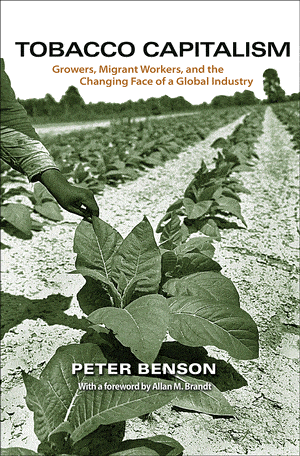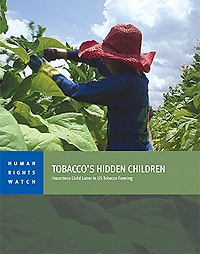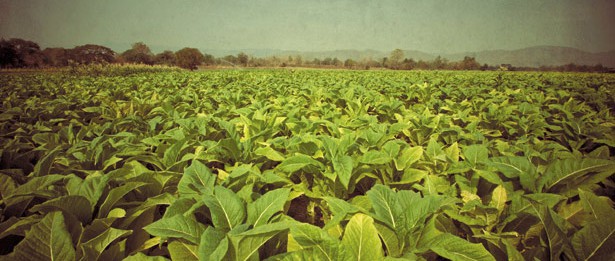Introduction by Allegra’s Reviews Editor, Judith Beyer.
Two weeks ago, Human Rights Watch released a report entitled Tobacco’s Hidden Children, in which it criticized the harsh working conditions of tobacco workers — many of them children. While it is illegal for children (anyone under 18 years) to buy cigarettes, HRW interviewed 141 child tobacco workers, aged 7 to 17, who labored 50 to 60 hours a week in the tobacco fields in North Carolina, Kentucky, Tennessee, and Virginia, where 90% of tobacco grown in the USA is cultivated. These children had to move heavy and dangerous equipment and suffered from nausea, vomiting and skin rashes, among other symptoms. The United States has signed, but not ratified, the Convention on the Rights of the Child and in contrast to many other countries (among them Brazil and India), has not prohibited child labor in tobacco farming. Several loopholes in US national laws and policies, but also the fact that the International Labour Organization (ILO) leaves it up to governments to determine which occupations are hazardous to children’s health, have contributed to the prevalence of child labor in the USA. Gabriela Rădulescu, currently an Erasmus exchange student at the Université Libre de Bruxelles, offers us a review of Peter Benson’s Tobacco Capitalism: Growers, Migrant Workers, and the Changing Face of a Global Industry (Princeton University Press 2011), a book which investigates the naturalization of structural violence in the tobacco industry based on ethnographic data from North Carolina, USA.
REVIEW
Tobacco Capitalism: Growers, Migrant Workers, and the Changing Face of a Global Industry
Benson, Peter. 2011. Princeton, Princeton University Press. Paperback. ISBN: 9780691149202, 336 pp.
The critique of ways in which corporations create or further inequalities and the spread of sufferance is of crucial interest to contemporary anthropological analyses of globalization. In Tobacco Capitalism, Peter Benson focuses on how tobacco issues related to health, the economy and social responsibility have been problematized, meanwhile offering a rich ethnography of tobacco growers in North Carolina, mainly through the lenses of both biopolitics and Levinas’ face ethics (Benson & O’Neil 2007: 32) . Tobacco remains the seventh most valuable agricultural commodity in the USA, yet ironically it also represents the single preventable cause of death. The paradoxical character of the industry does not stop here, however, as one of the most intriguing underlying topics of the book comprises an investigation into how those who are culturally invested with a negative role – namely, that of producing a harmful commodity – explain their position and construct their presence in relation to the corporations with whom they interact, and society as a whole.
While multinationals’ PR campaigns invest in the plighted citizenship image – a form of victimhood that attracts tobacco farmers’ support – the industry is moving offshore without resistance under a humanitarian face meant to hide its ambitions and clever advertisement.
The first chapter centers on the strategy that tobacco companies use in order to seize control over (potential) criticism (Benson & Kirsch 2010: 460), with the second chapter emphasizing how social identities have been, and continue to be, created along with the industry. Packaging ideas, individual trajectories and economical reforms correlate with an exact fantasy (Adorno cited in Buck-Morss 1977: 86), which renders the corresponding ideology dynamic in relation to empirical realities, as shown in the third chapter. Chapters Four to Six present a rich ethnography of tobacco farmers in which one is confronted by structural power relations that translate into cultural problems, ultimately allowing violence to be validated by the individuals who find themselves trapped in a panoptical system.
Examination of the naturalization of structural violence constitutes one of the strongest ingredients in the theoretical framework of this book, underlining the need to identify institutionalized dimensions of suffering. In other words, by resocializing violence (Benson & Kirsch 2010), anthropology can de-legitimize meanings inherent to commodity modes of production (Taussig 2010: 10) that harness racial identities to the adaptive dynamics of political and cultural power struggles (Lipsitz 1995: 378-380). One is faced by an ethical dilemma central to anthropology: where does responsibility stop? Furthermore, due to the fact that the same mechanisms that encourage economic growth seem to pose threats to the nation, a further existential question may be asked: are we dealing with an ontological necessity whereby material or economic advantage is never equably shared, so that inevitably some will be victimized at the expense of others – or is the notion of ‘risky choice society’ supposed to mean that some make the choices, while others take the risks (Žižek 2009: 13)?
There is a flip side to the coin of accountability, however. By describing the behavior of the farmers as a defensive response in a coercive harmony system (Nader 1997: 712-15), the impression offered is that their responsibility for their actions is minimized in analysis, despite the author’s denial in this regard. Nonetheless, while clearly subjected to structures of dependence that tie them to undeniably harsh material conditions, not only does the perspective explored in this work risk giving them easy credit as ‘the other’ in the sense of people whose story we have not yet heard (Žižek 2009: 42), but it also encourages a fallback position of passive accommodation with capitalism (Hickel & Khan 2012: 219), something to which the author himself is essentially opposed.
This critique should not, however, diminish in any way the fact that the phenomenology of perception needs a face rather than anonymity, which is possible only when actors have something at stake, a point crucial to Benson’s ethnography of tobacco farmers and workers in North Carolina.
Even if the author does not explicitly emphasize it as such, the ambiguity of the farmers’ responsibility can be seen as a structural problem sharing a common origin with the ignoble paradox of modernity emphasized in the book: the very same vectors of economic growth are, if not causes, then at least contributors to inequalities, social suffering, and symbolic violence. For this reason, scholars will find Tobacco Capitalism not only a well-documented ethnography, but also an invitation to explore the existential question of the extent to which each one of us is responsible for a problem that includes us all, but which we may fail to recognize due to the advantages we get from it daily.
References
Benson, Peter and Stuart Kirsch. 2010. ‘Capitalism and the Politics of Resignation’, in Current Anthropology, Vol. 51, No. 4, pp. 459-486. Chicago: University of Chicago Press.
Benson, Peter and Kevin Lewis O’Neil. 2007. ‘Facing Risk: Levinas, Ethnography, and Ethics’, in Anthropology of Consciousness, Vol. 18, Issue 2, pp. 29-55.
Buck-Morss, Susan. 1977. The Origin of Negative Dialectics: Theodor W. Adorno, Walter Benjamin, and the Frankfurt Institute. New York: Free Press.
Hickel, Jason and Arsalan Khan. 2012.‘The Culture of Capitalism and the Crisis of Critique‘, in Anthropological Quarterly, Vol. 85, No. 1, pp. 203-228.
Lipsitz, George. 1995. ‘The Possessive Investment in Whiteness: Racializes Social Democracy’, in Anthropological Quarterly, Vol. 47, No. 3, pp. 369-387.
Nader, Laura. 1997. ‘Controlling Processes: Tracing the Dynamic Components of Power’, in Current Anthropology, Vol. 38, No. 5, pp. 711-738.
Taussig, Michael T. 2010. The Devil and the Commodity Fetishism. Chapel Hill: University of North Carolina Press.
Žižek, Slavoj. 2009. First as Tragedy, then as a Farce. London: Verso.









